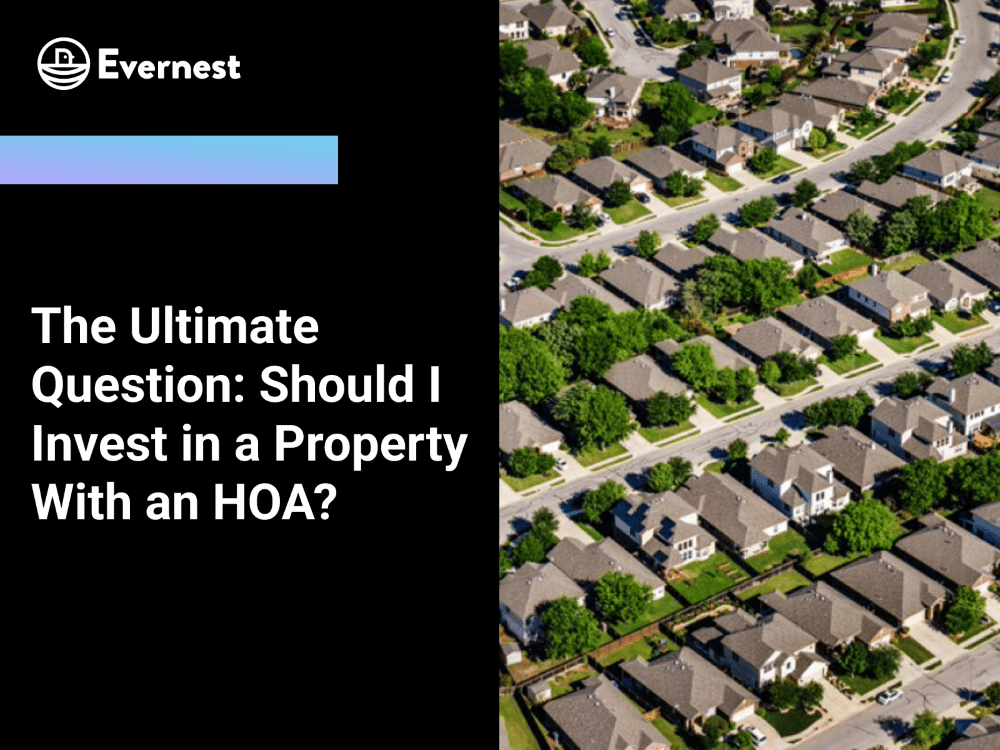Should I Invest in a Property with an HOA?
Many investors set out searching for prime real estate, but are instead greeted with a homeowner’s association, or HOA. Unless you already own a property with an HOA, you may have limited knowledge on what an HOA is and how they function. You may also be wondering, “should I invest in a property with an HOA?” Investing in HOA requires more effort, as you will have to deal with a lot of oversight and restrictions. Many investors find it worth the added challenges, though. Before investing in a property protected by an HOA, you must consider several things, from fees to upkeep. So, should you invest in a property with an HOA? Let’s dive in.
What is An HOA?
Before deciding whether to invest in an HOA property, it’s crucial to know exactly what this means. HOA stands for Homeowners’ Association. Their main objective is to manage residential communities through small governing bodies. They work to ensure that the homeowners maintain specific standards within their community, and you automatically become an HOA member if you buy a property protected by an HOA. Usually, the HOA members vote for a board of directors that runs the association. An HOA regularly maintains its community pools, playgrounds, and other amenities and, in exchange, the members pay a monthly or annual fee. All of the operational expenses are then covered by these fees. The types of properties that may belong to HOA are diverse, and may include single-family homes, condominiums, and townhomes.
Benefits of Investing in an HOA Property
Investing in properties protected by an HOA offers you a plethora of benefits. As an investor, you may enjoy reduced upkeep responsibilities, attractive community amenities, and high standards in the community.
Reduced Upkeep Responsibilities
In many cases, the homeowners’ association takes care of all the usual upkeep responsibilities for you. You just have to pay your HOA fee and they’ll take care of your lawn and plumbing, fix your roof, remove the trash, shovel snow from the front walk, manage typical landscaping, complete pest control, and more. While some people enjoy doing all of this on their own, many investors, specifically those with large or growing portfolios, enjoy having as few responsibilities as possible.
Exciting Amenities
Some HOAs also provide and maintain amenities that can appeal to various types of residents. Offering incredible amenities is a great way to attract residents and ensure they stay. Some of these amenities might include community clubhouses, pools, saunas, modern grills, a golf course, tennis courts, walking trails, and even community-wide social events. And to top it all off, the HOA typically takes on the responsibility of looking after and maintaining all of them. And the more facilities a resident gets, the more valuable your investment becomes
The HOA Disputes Problems Between Neighbors
The homeowners’ association does more than just take care of your lawn and maintain your amenities, though. They also help mediate problems between neighbors. If residents violate any rules or regulations, then HOA acts as a disputer. For example, if a resident has an issue with a neighbor and you don’t want any unnecessary tension, you can contact the homeowner’s association and ask them to resolve the issue for you. No more time spent mediating conflicts!
Keeps The Value Of The Property High
Unfortunately, in some cases, the appearance and value of a real estate investment can sink over time. HOA bylaws are written to help prevent these negative effects. For example, like leaving random belongings on the porch, consistently dirty driveways, and overgrown yards may be explicitly disallowed. Essentially, making a mess out of one property causes the entire neighborhood to lose value. HOAs help ensure any one resident can’t trash the whole block.
Disadvantages Of Investing In A Property With An HOA
While there are some great reasons to invest in an HOA-protected property, there are also a few downsides as well. For example, the regular HOA fees can cut into your profits, and the strict bylaws can interfere with your investment goals.
HOA Fees Disrupt Cash Flow
The monthly or annual fees that an HOA takes for taking care of your property and maintaining it can often be reduced if you hire a third party or do it yourself. So, it could represent a significant loss when it comes to your return on investment. That cost can range from a few hundred to a few thousand dollars.
Bylaws Can Interfere With the Rental Process
Depending on the bylaws, you may be unable to rent your property out after purchasing within the HOA. Some housing owners associations require you to own the property for a set amount of time before you can rent it. These kinds of rules can cause gaps in residency, which can seriously harm your return on investment.
Unexpected Owner Assessments Are Expensive
The HOA may randomly hold assessments, which can be quite expensive. In an assessment, the HOA decides that some components need to be replaced or repaired, and the owners are responsible for footing the bill. For example, perhaps the homeowners’ association decides that all the community roofs need to be replaced. To fund the job, the homeowners must pay $4,000 each. What’s more, if you sleep on the assessment, you’ll be penalized for violating the contract you signed.
Should You Invest in a Property With an HOA?
There is no one right answer when it comes to whether you should invest in a property with an HOA. While a homeowner’s association can be a great tool for many, for some investors, it simply doesn’t make much sense. Take some time to review the pros and cons, revisit your strategy and investing goals, and always read contracts and bylaws extremely carefully. Advice from a real estate attorney never hurts, either!

